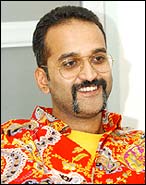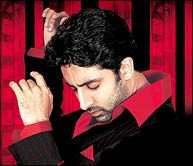 This Friday's release Bluffmaster looks promising. And the credit for that largely goes to its director, Rohan Sippy. This is his second film after the dud Kuch Na Kaho. And it stars his favourite actor Abhishek Bachchan once again.
This Friday's release Bluffmaster looks promising. And the credit for that largely goes to its director, Rohan Sippy. This is his second film after the dud Kuch Na Kaho. And it stars his favourite actor Abhishek Bachchan once again.
A few days before release, Rohan spoke to Komal Mehta about his film.
Do you plan to associate Abhishek with all your ventures?
Abhishek is a friend and a great actor. He is in a position where every director in the country wants to work with him -- from Mani Ratnam to Karan Johar. I'll always talk to him as long as he has time. But such things are circumstantial and one cannot plan it beyond a point. But, in principle, I'd love for him to be a part of everything I do.
Bluffmaster's music is quite unique. And you've used international musicians like Trick baby and Arash.
![]()
More on rediff.com!
![]()
![]()
![]()
![]()
Images: Fardeen's sangeet![]()
Pick Of The Week: Parzania![]()
'RGV's Sholay won't be made'![]()
![]()
![]()
I'm particularly fond of international music. In India, we've always taken western influences into consideration. Like the waltz and salsa are western; at each step, we've always been able to absorb it in our way. I was convinced that the young audience would like this world music. At first listening, you realise it is not what Hindi film music sounds like. The idea is to let it stand out from the rest. Trick baby or Arash's music is also available in India. But it's by associating that music with Abhishek, Priyanka Chopra and Riteish Deshmukh that the audience will give it a chance.
It is said that Sabse bada rupaiya was a Mehmood original, when it was actually reworked...
On the album, it says that Chetan sang Sabse bada rupaiya, but Mehmood's voice is also present. In an ideal world, we would have used Mehmood's voice, but because the track was so old and not in a good condition, we asked Chetan to sing on top of it to boost the vocal element. I've never tried to hide or deny it. It's on the CD.
People are short of headlines. But it's free publicity; write what you want! It's a non story.
 Tell us about Nana Patekar's role?
Tell us about Nana Patekar's role?
His role is the negative force in the film. He plays a menacing character. But he is witty, so he's got funny lines as well. That doesn't mean you'll take him less seriously though. He plays a character associated with Mumbai's underworld.
In a cast of mostly young people, why did you decide to cast him?
He was a dream casting. I did not exactly write the role with him in mind, but we thought there was no one better than him to take the film to the next level. It was wonderful of him to accept it because his is not a full-fledged role. It's like a special appearance. He's in the film for about 10-15 scenes only. But when he is there, he is there completely. I can't imagine any other actors playing these roles.
Did you have any memorable experiences during the making of Bluffmaster?
A lot of our memorable experiences came from being able to capture Mumbai the way we have -- rushing against the sunlight, managing to set the camera up and taking a frame and things like that. Just getting actors like Abhishek, Priyanka, Boman Irani, Nana Patekar and Riteish to act in the movie was unique enough because the narrative is unconventional.
Is an unconventional narrative risky?
How can you play safe in an unpredictable world? Take all the films that did well this year, was there any trend or predictability? In a situation like this, the biggest risk you can take is to take no risk at all. I think audiences are generally very accepting and that they will enjoy movies if you've made them with sincerity. You should not promise something and deliver something else.
What is Bluffmaster all about?
The movie is about Roy (Abhishek), a con man, and how he tries to teach the tricks of his trade to Dittu (Riteish Deshmukh). Roy's theory is something like this: 'Duniya samundar aur hum machli.' He believes in hooking the right fish with the right bait. That's why the tag line is 'Come Fishing'. Circumstances force Abhishek to reevaluate his beliefs. There are a lot of twists and turns like in a caper film, and a lot of humour. It's a film that flows smoothly from the start and, hopefully, keeps you engaged throughout.
What next?
There are a couple of things. We have recently acquired the rights of this book called One Night At The Call Centre by Chetan Bhagat. It's a nice book with real characters. Young people in India will relate to them. It is always tricky adapting a book because translating an 11-hour experience into a one-hour experience is difficult. What I like about Chetan is that he is writing about people in India and not writing for a foreign audience. Even his pricing of Rs 97 is good, because it makes the book accessible to everyone. I think he really has his finger on the pulse. So I'm ready to work on it when its ready. Chetan is working on its screenplay.
Did you ever consider making Sholay yourself? Ram Gopal Varma is remaking it, but why aren't you?
In my mind, it is ridiculous to even try and remake it. Yes, technically, you can. But that does not excite me because I can't think of doing anything that will ever top the original movie. Remaking Sholay is a good money-making proposition though, so I suppose that's a good reason for making it.
Rohan Sippy's photograph: Paresh Gandhi





